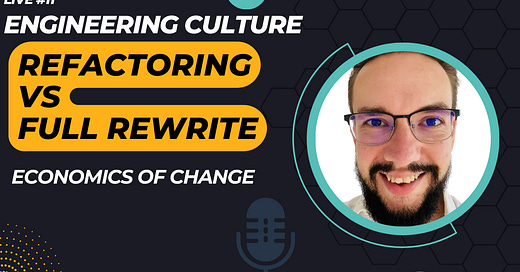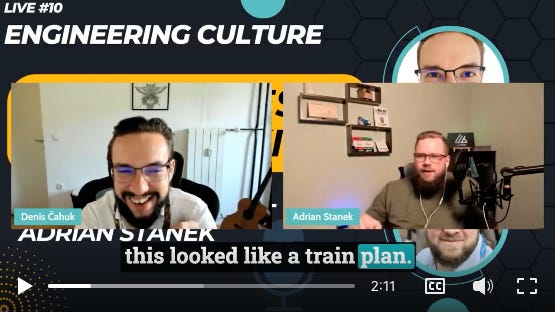👇 Note: 16:00 CEST is now the standard time. Sign up on the LinkedIn event to have it easily pop into your calendar. It will be recorded, but I suggest you join in live for the chat participation.
Please set an intention if you don’t want to miss it. Let us know you’re coming and put it on your calendar.
Agenda for the Live Stream
What drives rework, rewrite, change?
Build a culture of refactoring
Bad incentives that create a no-refactoring culture
Q&A, live discussion throughout the 60 minutes. Don't be shy!
Check your time: Some countries will start rolling daylight saving changes starting next week. The event local follows Paris/Berlin/Amsterdam time.
Last week’s Pull Request & Engineering Culture Recap with
Focus on Human Aspects of Engineering Culture
📚 Continuous learning is essential for software developers, as it helps them build a broad range of skills that can be applied to finding solutions in their unique contexts.
💡 Mono-tasking is about finding the largest number of people that focus on a single task without disrupting the flow, and putting more people on a task beyond that limit slows the team down.
💻 Creating a technical system that allows for regular team discussions and problem-solving sessions can help foster a culture where junior developers feel comfortable asking for help and learning from their mistakes without fear of blame.
Importance of Growth and Safe Environments for Juniors
💡 Encouraging failure and allowing people to make mistakes in a safe environment can lead to the growth and development of senior leaders.
🧠 Seniors are seniors because they make great decision. They make great decisions because of their vast experience—experience they attained by making bad decisions. A workflow for juniors that prevents them from making bad decisions will create a bubble for them. This bubble prevents them from maturing into senior responsibility and they will remain stuck as juniors.
💡 Adrian emphasizes the importance of engineering culture as the foundation of every organization where humans are involved, stating that everything depends on whether the organization is working smoothly on the cultural level.
💡 Adrian: Responsibility and accountability for working software should be in the hands of the developers. Suggesting that they should take ownership of their code and ensure it works properly before pushing it, rather than relying on pull requests for oversight.
🤔 Building a mature team with senior developers and a strong culture is important for successful software development, and team leaders should take responsibility for cultivating this culture from day one.
Pull Requests & Feature Branching
🤯 The idea of gradually moving away from pull requests and giving teams more autonomy in making changes can lead to increased productivity and faster delivery of value to customers. Often, the productivity is immediate due to the elimination of unnecessary ceremony in producing or testing software. Don’t optimise what shouldn’t be there.
💼 Focus on working features that shows market demand. Waste in software is often a result of investing time and effort into building feature that no longer have market demand. Because they took to long to develop or because the initial request for the feature was merely someone’s idea or wish list.
👮♀️ Stakeholders and product owners should not have direct access to a backlog. The backlog requires a level of scrutiny that eliminates wish lists, ideas and ruminations, separating low-value ideas from actionable tasks that have market demand.
🤔 The choice of framework for a project is not solely a technical decision, but rather a strategic and tactical decision that should align with the business goals and requirements.
🔄 The practice of quickly getting work into the customer's hands, similar to a craftsman repairing something in your household, should be applied in software development to ensure faster feedback and iteration.
🔄 Collaboration should extend beyond just developers and include other stakeholders to ensure clarity in business requirements and build quality into the process from the beginning.






